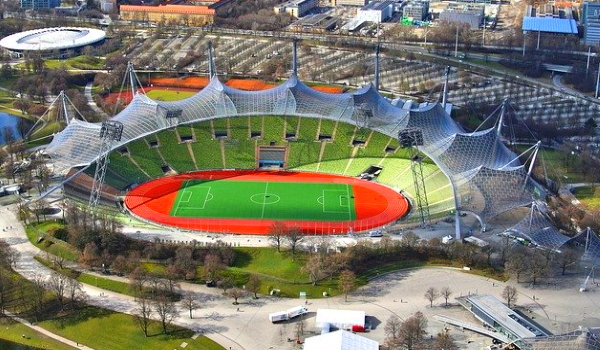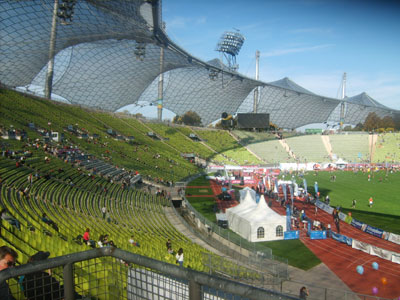During the 1972 Olympic Games, the Olympic Stadium in Munich was one of the most modern stadiums in the world. Especially the architecture was convincing: The roof consists of a very light-looking tent roof construction with masts up to 80 meters high. It is a multi-purpose stadium, which was used especially for football and athletics. FC Bayern Munich played here for over 30 years and TSV 1960 Munich played in the Bundesliga for many years.
 The Olympic Stadium
The Olympic Stadium
Originally, the stadium had 83,000 seats. Later, the number of spectators was reduced to about 70,000 for safety reasons. Both football clubs moved to the new Allianz Arena in 2005. Today the stadium is unfortunately rarely used, for example for other sporting events and concerts. Munich now has two large stadiums. Almost every other city in Germany would be happy to have one of the two stadiums.
The most important tournaments and games in the Olympic Stadium Munich were, besides the 1972 Olympics, the 1974 World Cup (the legendary final between Germany and the Netherlands, result 2:1, took place here) and the 1988 European Football Championship (also final between the Netherlands and the USSR 2:1). Other highlights in the stadium’s history are the European Athletics Championships 2002 and the Pope’s mass in 1987. According to many statistics, the Olympic Stadium in Munich is still the largest stadium in Germany after the Olympic Stadium in Berlin.
Munich city tour with a visit to the Allianz Arena: All football fans who come to Munich want to see the Allianz Arena (FC Bayern Stadium). That’s why the combination of a tour of Munich with a visit to the stadium is very popular. This 4-hour excursion also takes you to the training grounds and offices of FC Bayern in Munich-Giesing: More information and booking

Entrance fees: Admission to the stadium is possible on any day of the week when there is no event. Costs: 3,50 € for adults. The entrance fee for children under 16 is 2.50 €, families pay a maximum of 8.50 €. Children under 6 years are free. For free you rarely get to the Olympiastadion in Munich. However, it is possible at some events such as the annual Munich Marathon. All admission prices refer to the year 2020, the prices have not been increased for many years.
With the City-Tour-Card tourists get in Munich a reduced entrance fee to many sights.
Opening hours Olympic Stadium: In summer about 9 to 20 clock, in winter much shorter – about 11 to 16 clock.
Arrival with the underground line 3 stop Olympiazentrum or line 1 stop: Olympiaeinkaufszentrum (OEZ). Many parking spaces are available around the Olympic Stadium.
Short YouTube video overview of the Munich Olympic Stadium
Our tip: Sightseeing tour through Munich |
| A great possibility to see a lot of Munich in 1-2 days are the so called Hop On / Hop off buses. These are red double-decker buses in British style, which drive on 3 different routes through Munich. You can get off at many stops and continue with a later bus. Tickets for the hop on / hop off buses are much cheaper on the Internet at Getyourguide than on site. Further information: Click here |
In addition to the Olympic Stadium in Munich, there are two other Olympic stadiums in Germany: the Olympiastadion Berlin (Summer Games, admission fees Olympiastadion Berlin) and the Olympiastadion Garmisch-Partenkirchen (Winter Games). In total, Germany has hosted two Summer Olympic Games and only one Winter Olympic Games.
Olympic Stadium Munich history
The Olympic Stadium in Munich is literally significant in both sporting and architectural terms. Below are some important points about its history
Purpose of construction The Olympic Stadium was built as the main venue for the 1972 Summer Olympics. The idea was to create a corner sports facility that would not only serve the Olympic Games, but also be a symbol of the city of over a million people in the future.
Design The architectural design of the Olympic Stadium is characterized by a feather-light, roof-like structure. It was designed by the German pioneer Günther Behnisch and the pioneer Frei Otto. The plexiglass cover that covers most of the Colosseum gives it a truly distinctive look, making it a perfect mix of functionality and aesthetics.
1972 Summer Olympics One of the darkest moments in Olympic history occurred at these games – the Munich slaughter. Palestinian terrorists from the Black September group took members of the Israeli Olympic procession hostage, resulting in the deaths of 11 athletes and coaches. This dark event overshadowed the sporting events that took place in the Olympic Stadium and the surrounding Olympic grounds.
Sporting Events In addition to the Olympic Games, the Colosseum has hosted numerous other sporting events over time, particularly football matches. Until the opening of the Allianz Arena in 2005, the Colosseum was the home stadium of Munich’s two major football clubs, FC Bayern Munich and TSV 1860 Munich.
Musicals and other events The Colosseum has also been the site of colorful large-scale musicals and events featuring transnational stars and bands.
Even after the opening of the Allianz Arena as a sports facility, the Olympic Stadium remains an important architectural masterpiece. The entire Olympic site, which includes the Colosseum, the Olympic Palace and the Olympic Lake, is a popular recreational spot for locals and excursionists.
Decline in sporting use After the opening of the Allianz Arena in 2005, regular sporting use of the Olympic Stadium declined as Munich’s two major football clubs moved to the new Colosseum.
Today, the Olympic Stadium is a testament to innovative architecture and occupies a unique place in sports history, both for its sporting achievements and for the unfortunate events of 1972.
Munich city tour with a visit to the Allianz Arena: All football fans who come to Munich want to see the Allianz Arena (FC Bayern Stadium). That’s why the combination of a tour of Munich with a visit to the stadium is very popular. This 4-hour excursion also takes you to the training grounds and offices of FC Bayern in Munich-Giesing: More information and booking
Olympic Stadium Munich events
The Olympic Stadium in Munich has been the site of a variety of events over time, not only sporting but also musical and artistic. While the 1972 Summer Olympics is the most significant event to take place there, the Colosseum has been the venue throughout its history also the venue for numerous other events. Here are some of them
Sporting events
Football The Olympic Stadium has been the home ground of FC Bayern Munich and TSV 1860 Munich numerous times. It has hosted numerous Bundesliga games, DFB Cup tests and even European Cup and UEFA games.
Athletics Because it was designed primarily for the Olympic Games, the Colosseum was well equipped for athletics events and has hosted numerous such events over time.
Other Sports Other sporting events were also held at the Colosseum from time to time, including rugby matches and equestrian events.
Musical events The Olympic Stadium was a popular venue for numerous transnational musicians and bands touring Europe. Over time, a wide variety of artists have performed there, from gemstone bands to pop stars to classical musicians.
Here are some notable musicals and artists that have performed there
Rolling Stones The iconic gemstone band has performed at the Olympic Stadium several times as part of their European performances.
Michael Jackson The King of Pop played in front of full ranks in the Olympic Stadium as part of his „Bad“ performance in 1988 and during his „HIStory“ performance in the mid-90s.
U2 The Irish gemstone band performed at the Colosseum during several of their worldwide performances.
Madonna The Queen of Pop brought her spectacular shows to the Olympic Stadium several times.
Depeche Mode The British electronic band have played at the Colosseum during several of their tenures.
David Bowie The fabulous musician performed at the Olympic Stadium during his European stays.
Bruce Springsteen Springsteen, known for his energetic live shows, graced the stage of the Olympic Stadium with his E Street Band.
Coldplay The British gemstone band performed at the Colosseum as part of their worldwide performances.
Robbie Williams The British pop star performed in front of a packed Colosseum as part of his solo performances.
Ed Sheeran The global pop wonder came to the Olympic Stadium and amused the audience with his successes.
ordnance N‘ Roses The Gem Legends also performed at the stadium during their reunion.
Artistic and public events Colorful artistic events, public gatherings and observations have taken place at the Colosseum.
Film and television The Olympic Stadium’s iconic fixtures made it a suitable backdrop for colorful film and television products.
Now that the Olympic Stadium is no longer used primarily as a sports venue, it is used for colorful public events, exhibitions and other gatherings. Events also take place in the adjacent Olympic Park, where the Colosseum is occasionally used as a focal point or as part of the larger setting.
Tours Because of its literal and architectural significance, the Olympic Stadium and the adjacent Olympic Park were opened for guided tours, attracting excursionists and locals alike.
The exact events and their dates would require a closer look at specific times or eras, but the Olympic Stadium was truly one of Europe’s iconic locations for large gatherings, be it for sport, music or other forms of entertainment.
Advertisement